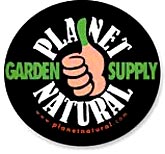I’ve got a question for all of you: Can an organic garden service that farms out toxic weed control still call itself organic? Has it sacrificed its integrity, its very soul, or is such language uselessly hyperbolic in such a case?
Let me explain how the question arose. Given the paucity of garden-related businesses that had booths at Bozeman’s poorly-named home and garden show (subject of one of my more acerbic posts), I had time for conversations with the folks staffing all three. Indeed, I swooped down on the two booths for organic gardening services, partly out of sheer delight that they existed, but in part to ask a highly pertinent question: How did they handle bindweed on a residential property?
This is highly pertinent because the bindweed in my neighbor’s lawn is gradually encroaching on my lawn, and I’m worried.
The folks at the first booth had never encountered bindweed in a lawn and didn’t know what they’d do. The two at the second booth had also never faced this problem, but assured me that they didn’t use toxic sprays; no, they’d call in a regular lawn-care company and have them do the spraying. That’s what they generally did with a serious infestation of noxious weeds. But, they repeated, they never used such chemicals themselves.
So here’s the question: Are these folks passing the buck, or are they being realistic? Are they as complicit in the use of herbicides as if they’d done the spraying themselves, or not? What’s the difference between an organic gardening company that hires out herbicide treatments, and one that applies them?
Is this merely a matter of definitions (just what does 'organic' mean, anyway?), or is it a moral dilemma?
(Yeah, I know, that's more than one question. Rub it in, why don't you?)

 Subscribe to RSS feed
Subscribe to RSS feed



I see it as a both/and situation. They’re complicit in the spraying, because if they didn’t bring in the other service, then the other service would have fewer customers. Thus, they’re responsible for some part of the spraying being done by the other company and could not in good conscience call themselves organic.
At the same time, the services they actually provide are organic, so technically as long as they’re not the same company, they should get to use the word.
The correct response to this sort of ambiguous weaselness is to say but if I wanted someone to spray chemicals on my lawn, I’d call them myself, not pay someone else to call them for me. And then give them a look that communicates that you’re disgusted by them, offended that they assumed you were an idiot, and embarrassed at how stupid they are to think that your lawn cares about which company is dumping the chemicals on it.
Not everybody can do that disgusted/offended/embarrassed look, though. Very high difficulty level. For a close approximation, practice by imagining that they’ve just ripped an enormous, unignorable, high-volume fart right in front of you, and you desperately need to get away from them before the smell reaches you without being too obvious that that’s what you’re doing.
Oh, you’ve outdone yourself, mr. s! That’s hilarious. I only forsee one problem: if someone (say, my husband) happens to catch me practicing said look before the mirror, just how will I explain myself? I shall have to print out your comment and carry it around in my back pocket; if challenged, I’ll whip it out and present it to my challengers who will, I am sure, retire in confusion.
–Kate
Yes. Sound logic, and justified indignation. I quite agree.
This brings up an interesting point about organic practices; namely, they’re more work intensive.
The more work a human has to invest, the more they have to charge for their labor and hence, the product. So, to keep their prices competitive, they reduce their work load (ethics ascribed by other posters).
Working “with or against” mother nature is just dirty, sweaty work. If you don’t want to do your own work, you’ll pay a handsome price for someone else to do it for you.
So, if you’re ready to dig in on bindweed, here is a helpful sheet with references, sans synthetic chemicals.
http://www.pesticide.org/bindweed.html
Thanks, Garden Dot, though I haven’t quite made up my own mind whether to stand by my initial indignation or not.
FSG, if you had pointed me to a site that helped me get bindweed out of a lawn, you’d have beem my everlasting hero. Unfortunately, that exalted status is yet denied you; most of the tactics mentioned on that page (plastic mulch, hoeing, flame weeding, even pulling the young shoots) are ones I already use in the garden area, where the situation is under control, but they tend to be
discouraged in lawns. (Somehow I don’t think my neighbors would be pleased if I went over their backyard with a flamethrower.)
The gall mites, however, are new to me; I’ll have to see if those would survive in Montana, and if there are any drawbacks to using them.
Thanks for weighing in, though!
–Kate
That’s an interesting question. I suppose that either answer is correct, it seems like it could be a very controversial topic. I would have to do more research. Thanks for sharing! Also would you mind visiting this blog? http://www.citrusfruittrees.net/ Thanks again!
My response is absolutely no. No business can call itself organic if they also work with toxins… it is totally hypocritical. Sorry to be so abrupt. This is how I see it. If there were no buyers of toxic chemicals they would not be produced. ;>)
Though I still have lots to learn about organic gardening but one thing though that I know is that when you do gardening, its survival really depends on how you take care of your garden.
As a chem minor, I have to say, I have ALWAYS hated the use of the word “organic.” (Is it carbon-based? Check!) I would think, that these days, given the rampant approval of big business’s organic certification and the ensuing leniencies of the certification process, that the term ought to mean very little to other consumers as well.
I think you were right to be upset about the company’s use of outsiders to remedy their noxious weed problem and I find myself ticked as well with their self-righteous contempt of the “regular company” that would use, you know, those toxic chemicals, that we don’t use. But we hire out for… They are complicit. I also love the bizarre self-involvement to the reassurance in which they give you that they themselves would not use those bad, bad chemicals, as if you had asked the question out of concern for their health!
The word “organic” has become such a strange touchstone. I think, as Feed Store Girl points out, the less detrimental ways of dealing with agricultural dilemmas tend to be the labor intensive ones and not the quick fixes. In the end, I think we’re still left in the position of being responsible consumers. If it’s a priority for us, then we need to find out more about where our sources of produce come from and what our sources of service utilize. So kudos for asking about the bindweed.
While I’m on the topic of organic vs. conventional, I might point out that there are a lot of organic practices that are just as ecologically damaging as using chemicals: biological control being the first that comes to mind. For example, cane toads brought to Australia to serve as rat and pest control. Brilliant conception, poor outcome. And not a thing of the past. We’re getting better at determining what species (be it plant or insect) might be prone to becoming invasive, but it’s still very, very experimental. Plants and animals do adapt, and often rather quickly.
Another backyard example of organic practices gone astray, and one you don’t hear much about: those lovely worms that are sold to help compost? Invasive, and responsible for outeating our own earthworms.
Returning the focus to consumer agriculture, another example would be the use of plastics to concentrate heat on crops. As it’s not affecting the content of the soil, it is considered fine under the organic labeling. An ecologically concerned consumer might not appreciate the use of mass (and I mean mass) quantities of dark plastic used in this type of crop production, and shudder to think of the aftermath–what happens when these plastic sheets have outlived their utility?
My apologies for the length of this comment, but your excellent line of questioning gave me a bout of verbal diarrhea.
Lawns are fine to play soccer. In the house only if cut by goats, cows, horses or by/with a push mower.
Otherwise they are ecologically INCONRRECT.